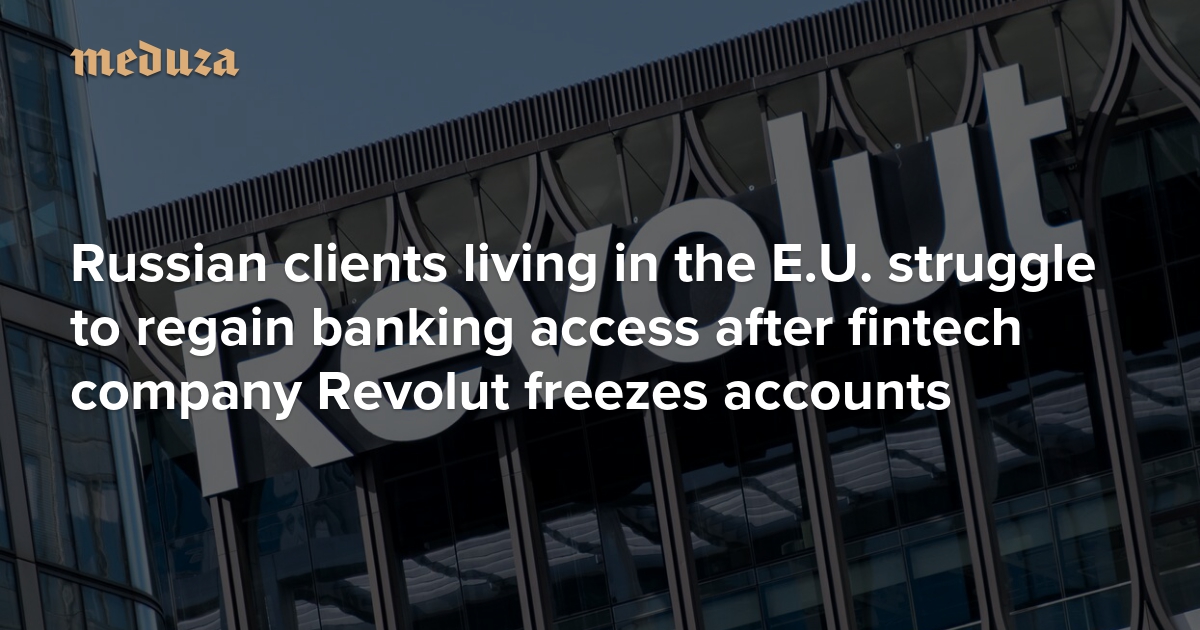
Banking Access for Russian Clients in the E.U. Takes a Hit
Imagine having your bank account suddenly frozen, leaving you with no access to your hard-earned money. This is the reality for many Russian and Belarusian clients living in the European Union who woke up to find their accounts frozen by the fintech company Revolut. The move, aimed at aligning with the E.U.'s latest round of sanctions against Russia, has left a significant number of Revolut's clients in a serious financial bind.
On the night of October 31, Revolut began informing its Russian clients via email, demanding proof of valid E.U. residency. Moments later, a chilling follow-up email notified many of these clients that their accounts had been frozen, effectively barring them from using their banking services. Clients have been left unable to perform basic banking tasks: no card usage, no ATM withdrawals, and no transferring funds. These account freezes came with a termination date looming on December 31, 2025, adding further urgency to the situation.
The abrupt decision appears to target customers who had initially opened their accounts using E.U. residence permits or long-term stay visas. Despite providing what they believed to be valid documentation, users have faced significant technical glitches preventing them from restoring access to their accounts, fueling widespread frustration and anxiety among affected clients.
Revolut, a leading online bank without physical branches, explained their dramatic step as necessary compliance with international sanctions against Russia. The new E.U. restrictions, part of the 19th sanctions package enacted on October 23, prohibit providing "payment services or electronic money services" to Russian and Belarusian citizens residing outside the E.U., EEA, or Switzerland if they lack suitable residency or citizenship documentation.
The root of this upheaval lies in the E.U.'s comprehensive sanctions package against Russia, enacted to counter Russia's ongoing actions in Ukraine. Revolut, aiming to adhere to these complex international sanctions, found itself navigating a regulatory storm while trying to maintain compliance with multilayered sanction laws from bodies like the UN and the EU. As a globally regulated financial institution, the company emphasized its legal obligations to comply with these restrictions.
Technical hurdles have significantly compounded the trouble for users attempting to verify their residency status. Initial frustration mounted as Revolut's customer support struggled to respond promptly to the flood of inquiries. The company later conceded to experiencing a "technical issue" in their document submission system, which left many users in a prolonged state of financial limbo. Media outlets including various news services reported numerous cases highlighting the plight of affected users unable to upload required documents to regain account access.
While similar actions haven't been widely reported from traditional E.U. banks, Revolut's interpretation of the sanctions might set a concerning precedent as other digital payment services consider following suit. The absence of such restrictions at conventional European banks has raised questions about whether Revolut's approach represents an overly strict interpretation of the sanctions requirements, or whether other financial institutions will soon implement similar measures.
The cryptocurrency and broader fintech landscape isn't immune to these developments either. Already, some crypto platforms have imposed their own restrictions, with exchange platform Bybit's E.U. operation ceasing to open new wallets for Russian citizens, while its international platform remains more accessible. This hints at a tightening grip on financial services available to Russians abroad and suggests a varied interpretation of sanctions across different platforms and jurisdictions.
Despite the initial chaos and widespread technical difficulties, some users have started regaining limited access to their accounts as Revolut works to resolve the technical issues plaguing their verification system. Those currently in the process of obtaining residence permits might see restrictions lifted sooner than others, though the timeline remains uncertain. By November 1, several Revolut customers had managed to regain access to their accounts, while others found partial restoration as they navigated through the complex verification process.
However, the uncertainty continues to loom large for many affected clients who remain locked out of their accounts. The situation has highlighted the vulnerabilities that digital banking customers face when regulatory changes intersect with technical failures, leaving users without access to their funds for extended periods. While Revolut strives to untangle the web of technical issues and regulatory compliance, many clients continue to wait anxiously for full restoration of their banking services.
This unfolding situation represents more than just a technical glitch or compliance measure – it illustrates the broader challenges facing the fintech industry as it navigates increasingly complex international sanctions regimes. As digital financial services become more prevalent among expatriate communities, the impact of such restrictions becomes more pronounced, potentially affecting thousands of users who rely on these platforms for their daily financial needs.
The Revolut account freeze saga serves as a stark reminder of the interconnected nature of global finance and geopolitics, where regulatory decisions can have immediate and far-reaching consequences for individual users caught in the crossfire of international sanctions.







